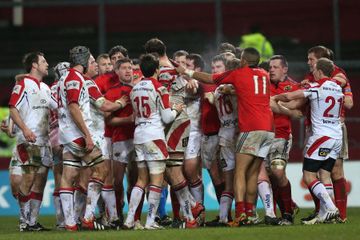Ironically, both provinces find their highly hazardous route blocked by English teams run in each case by one of their own.
Munster's quarter-final against Harlequins at The Stoop puts them on a collision course with the London club's director of rugby, Conor O'Shea - from the Munster heartland of Co. Limerick even if he did represent Leinster during a Test career spanning 35 caps for Ireland.
Ulster's trip in the last eight will also take them to London or the London area to face Saracens, even if as yet they cannot be sure exactly where the tie will be played.
Whatever the venue, an Ulsterman, Mark McCall, will be waiting to ensure his native province is given the heave-ho.
Just as O'Shea guided Quins to the English Premiership title last season, so McCall did the same for Sarries 12 months earlier.
And just as Quins will settle for nothing less than becoming the first English club to conquer Europe since Wasps in 2007, so the Fez Heads will not rest until they have beaten them to it.
Neither, of course, dares look beyond the next round. Quins' refusal to switch the tie across the road from The Stoop to Twickenham underlines their determination not to dilute home advantage.
In that respect they could hardly pay Munster a higher compliment. The alternative would be open the gates at 'HQ' and invite the Red Army to make it sound as though Quins are back at Thomond Park where the Londoners famously won in the Amlin Cup two years ago despite losing Nick Easter to a pair of yellow cards.
That Munster made it into the last eight, despite being without the injured Paul O'Connell and the suspended Ronan O'Gara in a Heineken Cup tie for the first time in 14 years, will not have surprised Quins even if they made it at Leinster's expense.
Nobody qualifies for the quarters quite like Munster. On the tenth anniversary of their Miracle Match against Gloucester, they marked the occasion with a five-pointer against a Racing Metro team forced to go virtually the entire distance with 14 men after the English referee Wayne Barnes sent Antoine Battut off for the earliest of early baths.
Quins, by contrast, have not been this far since April 2009 and the fateful home tie against Leinster. For the English club, the repercussions extended far beyond the narrowest of defeats into the investigation of the so-called 'Bloodgate' affair which claimed several victims, notably Quins' then director of rugby, Dean Richards.
Ulster, through to the knock-out stage for the third season in a row after long years of failing to get out of their pool, have no reason to fear any quarter-final anywhere.
Saracens, unlike Quins, will have no home advantage worth talking about given that they have yet to play their first match at their latest base, on an all-weather pitch at Barnet.
Historically, no venue is as daunting as Thomond Park. Ulster won there 22-16 in the quarters last year thanks to a try from Craig Gilroy, five goals from Ruan Pienaar and a drop from Ian Humphreys.
When the 1999 winners pitch up in the first week of April for their date with Sarries, wherever that may be, McCall will not be lacking any inside information on his native province.
"It will be good to see so many old friends again," he says. "But it will also feel a bit strange."
He pays generous tribute to Ulster's 'phenomenal season' and puts them on a pedestal with Clermont Auvergne as the form team of the competition. Should Ulster advance to the semis they will have a home tie on Irish soil against Toulon or Leicester which promises to be more rewarding than having to tangle with Clermont in France.
If Munster win at The Stoop, a very big if given that nobody has won there since late September, they will then expect to be lumbered with the shortest of short straws, Clermont away.
Montpellier, through to their first quarter-final at only the second attempt, lost 36-18 at the Stade Marcel Michelin on the first Saturday of the year - no disgrace considering that nobody has won there for more than three years.
Munster's road to the final is, therefore, a more hazardous one than Ulster's. Rob Penney's proclamation that his squad is 'on the pathway to something special' underlines their evolvement since the New Zealander took charge as director of coaching after Tony McGahan's return to Australia.
The champions of 2006 and 2008 are still alive which is more than can be said of Toulouse, the only club to win four Heineken finals, and Leinster, whose exhilarating domination of the European game made them strong contenders to win three finals in a row, a hat-trick denied them in the final analysis by, of all people, Munster.
Another all-Ireland final, to follow Leinster's victory at Twickenham last year and the unforgettable way in which their 15-man game engulfed Ulster, would appear to be unlikely.
Even so nobody will be surprised if last year's runners-up make it all the way to Dublin which, of course, is where they won Ireland's first final back at the end of the last century.
Should both the RaboDirect PRO12's survivors fail to reclaim the trophy and Leicester are counted out down by the Mediterranean, then one of five clubs from England and France will be winning it for the first time - Harlequins, Saracens, Toulon, Clermont or Montpellier.














